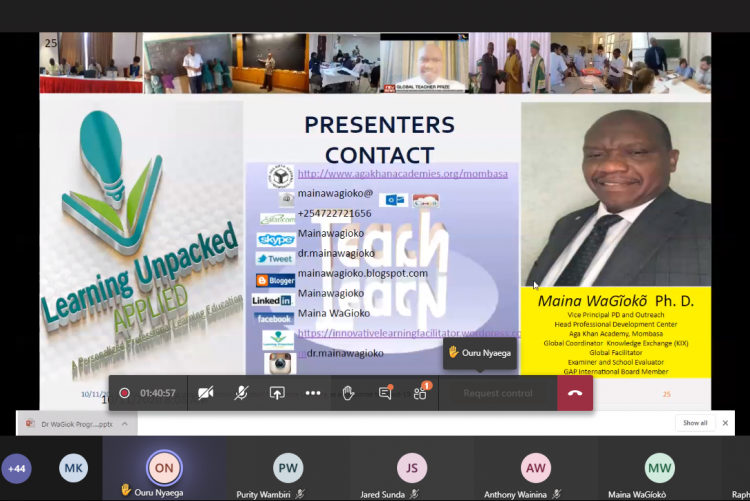The 3rd edition of the Research Week, an annual event hosted by the University of Nairobi (UoN) closed on 16th October 2020. This was after running for a whole week, beginning on the 12th of October. In total, 13 different conferences covering a diverse range of academic disciplines took place.
The conferences covered topical issues that are happening around the globe currently. As an example, the College of Biological and Physical Science Conference had a keynote by Prof. Ogallo who highlighted Kenya’s preparedness in the fight against global warming. In his address, he made reference to the mission to reduce greenhouse gases by 45% by 2030 and 0% by 2050.
He made reference to the importance of big data in Kenya’s preparedness through analysing aspects such as is there a part of Kenya that is warmer than 1.5 to 2 degrees? Prof Ogallo stressed the importance of community development in research and solution-generation.
In the college of Humanities and Social Sciences (CHSS) Multidisciplinary Conference, the Philosophical Insights in Healthy Living: Towards Warding Off Obesity in Children in Early Years of Education in Kenya was presented by Prof Atieno Kili Kodhiambo.
Prof Kodhiambo underlined that, 4% of pre-school children in both urban and rural areas in Kenya are obese, while 18% are overweight. The main cause of this state of affairs is eating processed foods. The problem is that measures to address childhood obesity in Kenya are hampered by the influx of processed foods which are sold in the country. This requires a shift in mindset through critical pedagogy (education by questioning) by asking “why” by both the parents and children about the foods.
He insisted that we should question why international junk food sellers should be allowed to establish themselves in the country under the guise of investing and offering employment to the citizens, yet in their home countries these businesses are restricted by stringent laws and consumer-conscious population. He stated that young learners and their parents/guardians should be made aware of the dangers of processed foods and that parents and children need to ask “why” in terms of what they are eating.
Fatha Abdirahman a PhD Student presented a paper on the Effects of Social Media on Parental Bonding: Case Study of Divorced Single Mothers in Garissa County, Kenya. The presenter opined that that the use of social media has increased exponentially in recent years with a growing amount of research indicating that it is affecting social relationships including within the family. Garissa was used as a case study because of its Somali population which highly values familial relationships. Data was obtained from single divorced mothers in Garissa County.
It was found that most of the respondents were educated and unanimously agreed that they spent at least 3 hours on social media and had lost connection with their children after joining social media and would be bored without social media, instead of enjoying time for attachment with their children. Some used social media to hibernate from the divorce stigma, find spouses and others used it for economic empowerment. Most of the parents reported absence of their children from home.
A fifth of the respondents reported being bad influence on their daughters. It was concluded that excessive use of social media affects the parenting of divorced single mothers negatively. Social media is a means of connection, but excessive use is leading to distracted parenting which is a direct threat to child welfare. She recommended mentorship programs for parents that focus on the importance of parental bonding and appropriate utilization of social media.
Zipporah Kwamboka Otiso delved into a brief overview of what fake news/misinformation means, as well as history on how it developed. This is as she sought to explain Media and COVID-19: Information versus Infodemic. She then discussed some of the misinformation around the COVID-19 pandemic which has led to stigma and hate. Examples include Trump calling it a Chinese virus and Indian Muslims being accused of spreading the virus.
There was also information/infodemic on cure, which caused bad practice regarding cures: Nigerians overdosed on hydroxychloroquine; in Namibia, there were claims that elephant dung was a cure; in Iran alcohol (which led to heart failures and blindness); in India, Ramdev claimed to have found an Ayurvedic cure. The media has faced a number of challenges in disseminating the right knowledge on COVID-19.
These include hundreds of posts with misinformation have been left online without any warnings; there are malicious accounts on social media that spread propaganda; socio bots, cyborgs and trolls have been created to spread fear through fake news. Some of the strategies than can be used to combat this include removal of false content from social media platforms by the platform owners, double checking of facts to determine their accuracy, avoiding creation of hype over news that is not true.
It was concluded that the media is a source of information but can also be a source of misinformation hence people have to be vigilant by double checking the information provided on social media. Netizens should be sensitized by owners of platforms and legal action should be taken against creators of fake news. There should also be an interlink between traditional and social media (the former should pick up the misinformation and present it in the right way).
Make a point of joining us next year for more insightful presentations at the 4th edition of the UoN Research Week.
(Continued}

